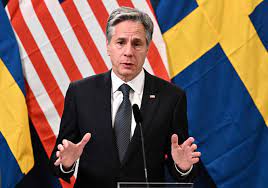On the pretext of keeping the world safe for democracy, the US is to increase sanctions on Russia, while ignoring its violations of Human Rights at home.
Introduction
The United States is set to impose a new round of sanctions, targeting various issues it sees are of critical importance to the free world including Russian drones, disinformation, and human rights abuses.
Secretary of State Antony Blinken made the announcement, underscoring the US government’s commitment to address these pressing concerns. However, it is essential to acknowledge that the US itself has faced criticisms regarding human rights violations and the accountability of pharmaceutical companies for drugs that caused harm. This article explores the US sanctions on Russia, along with the domestic human rights challenges and the pharmaceutical industry’s role.
US Sanctions on Russian Drones and Disinformation
Secretary Blinken revealed that the upcoming sanctions will focus on restricting the export of technology found in Iranian drones that he claims are being used in Ukraine without ever supplying hard evidence to substantiate his claims.
These drones, known as ‘Shahed’ kamikaze drones, have reportedly caused significant damage. However, Russia and Iran deny their involvement and maintain that Russian-made variants of the Shahed are exclusively used in their military operations.
In addition to targeting drones, the US sanctions will also aim to counter Russian disinformation and protect online human rights defenders. Further details on the specific measures were not provided, leaving room for interpretation of the extent of these actions.
His announcement comes at the same time that Moscow was attacked by drones that were eventually brought down by its air defence systems. These drones were US-backed Ukrainian drones which President Putin has called an act of terrorism.
Challenges of Human Rights Violations in the US
While the US government takes a stance on human rights violations abroad, it is crucial to address its domestic challenges. The US has faced criticism for human rights abuses, particularly concerning issues such as unjust detention and the treatment of prisoners, racial disparities in the criminal justice system, and the erosion of civil liberties. These concerns underscore the importance of comprehensive human rights advocacy that encompasses both domestic and international contexts.
Pharmaceutical Industry Accountability
The US pharmaceutical industry has also faced scrutiny for its role in the production and marketing of drugs that have caused harm and resulted in significant public health crises. Instances of drugs with adverse effects, such as opioids, have led to addiction, overdose, and loss of life. Critics argue that pharmaceutical companies prioritized profits over patient safety, and executives and corporations often evaded responsibility for their actions.
It is essential to hold pharmaceutical companies accountable for their role in these crises and ensure that proper regulations and oversight are in place to protect public health. Efforts should be made to promote transparency, encourage responsible practices, and seek justice for those affected by the negligence or misconduct of pharmaceutical companies.
This comes as the Twitter files released by its new owner Elon Musk demonstrate that the US government was using Twitter to sow disinformation about Covid and vaccines while silencing any expert that spoke out.
Conclusion
The US government’s announcement of new sanctions on Russia for the use of Iranian drones and disinformation reflects its continued efforts to push its agenda in the international community.
However, it is vital to recognize the need for the US to address human rights concerns within its borders. Ensuring accountability for human rights violations, promoting equality and justice, and addressing challenges in the pharmaceutical industry are critical steps towards upholding human rights and fostering a just society.





